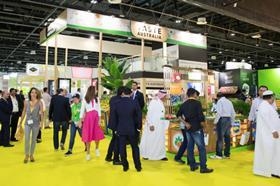
The Middle East’s leading fresh produce exhibition, International Perishables Expo Middle East, otherwise known as WOP Dubai, returned to the Dubai World Trade Centre in December for another successful fair. The event was held under the patronage of H.H. Sheikh Hamdan bin Rashid Al Maktoum, Deputy Ruler of Dubai, Minister of Finance and Chairman of the Dubai Municipality, in conjunction with the International Plants Expo Middle East, IPM Dubai.
The two exhibitions hosted over 300 exhibitors from across the world, showcasing a wide variety of products and services to meet the growing demand of the region’s major cities.“The UAE in particular has a fast-growing market for fresh produce, including organic products,” said Tarek Sibai of Planetfair, which organises the show with Messe Essen. “The tandem between IPM and WOP continues to get better each year, creating a niche market concerned with building a more sustainable and healthier environment. The opportunity for growth is huge and we can expect a bigger and greener event next year.”
The exhibition welcomed group stands from a number of countries, including China, Greece, Australia, Morocco and Egypt. Sam Lawrence, trade manager of Horticulture Innovation, hosted a sizeable group stand for Australian exporters targeting the region.
“We are working on our Taste Australia programme here in the Middle East, which positions the Australian origin as a premium source of produce on overseas markets,” he said. “We are doing promotional events in Saudi Arabia, Kuwait and Dubai. Our aim is to target influencers, including food bloggers and magazine editors, people who have a good reputation and can spread the message about Australian produce. We work together with the meat and dairy sectors, and that helps us to offer a full food package to the market. We’re a high-cost producer and there is a lot of competition on the market, but Australia enjoys a very good reputation as a reliable supplier of high-quality produce.”
Michael Wang of Chinese kiwifruit exporter Qifeng Fruit said that the company was targeting the Middle East market again having trialled a container to Dubai back in 2013. “We have five very good varieties,” said Wang. “We have new green varieties that are much sweeter than the Hayward, and we also have the very sweet red kiwifruit. Consumers need time to accept these varieties. There are lots of importers and traders here in Dubai, so we are sure we will find the right partner here.”
Moroccan exporter Groupe Arbor sends a variety of products to the Gulf, depending on the season and the price. “The volume from Morocco is growing on this market,” said Hicham Al Airaj. “We are a well-known source for citrus and tomatoes. We are increasing our production and want to expand here in Dubai.”
French apples were also well represented at the exhibition. Mohamed Chair of exporter Apple-Bird reported that the market for Royal Gala had improved in the Gulf, with volumes across Europe falling, especially from Poland and Italy, leading to better prices. “There is greater demand from new customers and they are willing to pay our prices,” said Chair.
Pascal Corbel of Cardell Export revealed that the company was focusing on its niche varieties for the Gulf market. “Even if prices are difficult here in the Middle East, volumes of niche varieties like organic variety Juliet and Honeycrunch are still growing strongly here in the UAE.”
Exhibiting at WOP Dubai for the first time were six Azerbaijani exporters, supported by promotional organisation AZ Promo, which supports the country’s non-oil exports, helps to attract investment and organises export trade missions and participation in exhibitions.
Elnur Aliyev, Azerbaijan’s trade representative to the UAE, said that Azerbaijani vegetables were known for their special taste due to the country’s positioning in the Caucasus Mountains. “Azerbaijan is a small country, but it has nine different climatic zones,” said Aliyev. “That means we can grow everything – kiwifruit and bananas in the south, apples, stonefruit and pomegranates in the north. Our tomatoes are mostly grown in Baku and are famous for their premium quality.”
In cooperation with WOP Dubai, Fruitnet Forum Middle East offered a wide-ranging programme of presentations and discussions the day before the exhibition. The Forum included presentations from Faisal Jumaa Al Badaiwi of Dubai Municipality about developments at Al Aweer fruit and vegetables market; from Mohammed Abbas of Fresh Del Monte on the growth of the fresh-cut and convenience food market; and from Sky Kurtz of UAE producer Pure Harvest on how high-tech domestic production looks set to revolutionise the country’s food sector.
These presentations were followed by two panel sessions. The first, with Paul Morgan of Spinneys and David Prokopiak of Kibsons, focused on the latest trends in the retail sector, including the growth of direct imports and online deliveries. The second focused on the keys to building a successful brand in the Middle East and featured an international panel of Marc Peyres of French exporter Blue Whale, David O’Brien of LucaZara, which handles the Pink Lady brand in the region, and Nick Nafpliotis and Labis Lagos of Greek companies Greek & Fresh and Labidino.



